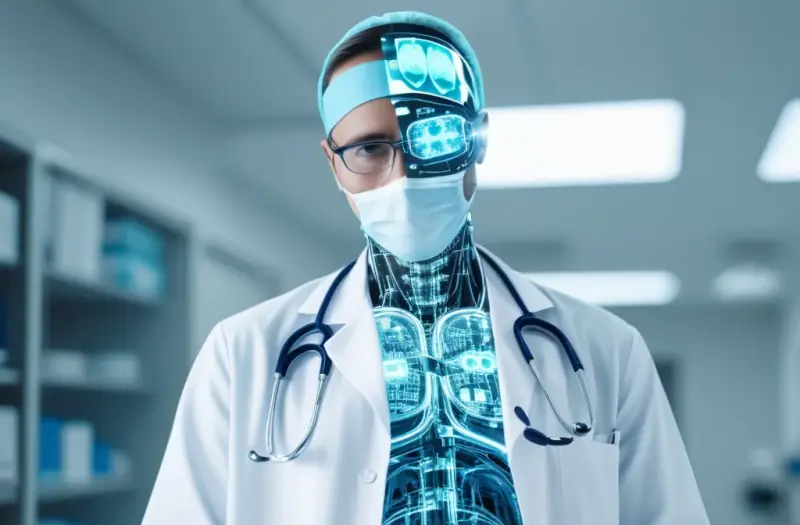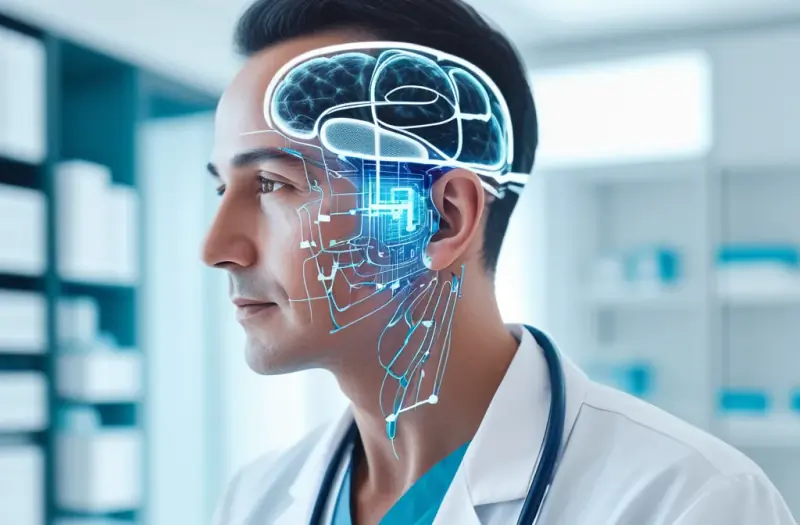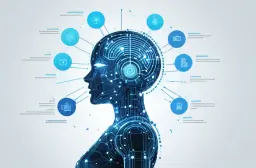Healthcare AI: Revolutionizing Patient Care

Table of Contents
Introduction
In recent years, healthcare artificial intelligence (AI) has emerged as a groundbreaking force in modern medicine. The integration of AI into healthcare systems is not just a trend but a significant shift that is transforming how patient care is delivered. As we navigate through this new era of medical innovation, it’s essential to understand how AI is revolutionizing patient care and the profound impacts it has on the healthcare industry.
Healthcare AI encompasses a range of technologies designed to improve medical outcomes, streamline operations, and enhance patient experiences. From medical AI algorithms that assist in diagnosing diseases to health technology AI systems that optimize treatment plans, the potential benefits of AI in healthcare are immense. In this article, we will explore the various facets of AI in medicine and how it is reshaping the future of patient care.
The Rise of Healthcare AI

Transformative Technologies in Healthcare
Healthcare AI has made remarkable strides in recent years, thanks to advancements in healthcare machine learning and clinical AI. These technologies enable computers to learn from vast amounts of health data, allowing for more accurate diagnoses and personalized treatments.
- Medical Decision AI: AI systems can now analyze medical data to provide recommendations for treatment plans. These systems use medical predictive analytics to foresee potential health issues before they become critical.
- Health Data AI: By processing large datasets, AI can uncover patterns and insights that human practitioners might miss. This capability enhances diagnostic accuracy and helps in developing targeted therapies.
- Healthcare Automation: AI-driven automation tools streamline administrative tasks, reducing the burden on healthcare professionals and allowing them to focus more on patient care.
Benefits of AI in Patient Diagnosis
The application of AI in patient diagnosis has been a game-changer. Through medical machine intelligence, AI tools can assist in identifying diseases with high precision.
- Early Detection: AI algorithms can analyze medical images and detect early signs of diseases such as cancer, often before symptoms appear.
- Improved Accuracy: With health analytics AI, the risk of human error in diagnostics is significantly reduced. AI systems cross-reference patient data with a vast database of medical knowledge to ensure accurate results.
- Personalized Medicine: AI helps in tailoring treatments to individual patients based on their unique health data, leading to more effective and personalized care plans.
Enhancing Patient Experience with AI
Streamlining Healthcare Operations
One of the significant impacts of AI in medicine is its ability to enhance patient experience by streamlining healthcare operations.
- Patient Scheduling: AI-powered systems can manage appointment scheduling, reducing wait times and optimizing the use of healthcare resources.
- Virtual Health Assistants: Chatbots and virtual assistants powered by intelligent healthcare systems provide patients with timely information and support, improving overall patient engagement.
- Data Management: AI tools simplify the management of electronic health records (EHRs), making it easier for healthcare providers to access and update patient information.
Improving Patient Outcomes
AI’s role in improving patient outcomes cannot be overstated. By leveraging health informatics AI and medical predictive analytics, healthcare providers can offer better care.
- Predictive Analytics: AI systems analyze patient data to predict potential health issues, allowing for proactive interventions.
- Treatment Optimization: AI-driven insights help in selecting the most effective treatments based on patient-specific data.
- Remote Monitoring: AI enables continuous monitoring of patients’ health conditions through wearable devices, leading to timely interventions and better management of chronic diseases.
Challenges and Considerations

Data Privacy and Security
With the integration of AI in healthcare, data privacy and security are paramount concerns. Ensuring that patient information is protected from unauthorized access is crucial for maintaining trust in AI systems.
- Compliance: Healthcare AI systems must comply with regulations such as HIPAA (Health Insurance Portability and Accountability Act) to safeguard patient data.
- Encryption: Implementing robust encryption methods helps in protecting sensitive health information from cyber threats.
Ethical Implications
The use of AI in healthcare also raises ethical questions. Ensuring that AI systems are used responsibly and without bias is essential for equitable patient care.
- Bias in AI: Addressing potential biases in AI algorithms is necessary to ensure fair and unbiased treatment for all patients.
- Transparency: Maintaining transparency about how AI systems make decisions helps in building trust and ensuring ethical use of technology.
Future Directions for Healthcare AI
Innovations on the Horizon
The future of healthcare artificial intelligence holds exciting possibilities. As technology continues to advance, we can expect new innovations that will further enhance patient care.
- AI-Driven Drug Development: AI has the potential to accelerate drug discovery and development, leading to faster availability of new treatments.
- Enhanced Diagnostic Tools: Future AI systems will offer even more advanced diagnostic capabilities, improving early detection and treatment of diseases.
- Integration with Genomics: Combining AI with genomics will enable personalized medicine to reach new heights, providing tailored treatments based on genetic information.
The Role of AI in Post-Pandemic Healthcare
The COVID-19 pandemic has highlighted the importance of technology in healthcare. AI will play a crucial role in post-pandemic recovery and preparedness.
- Pandemic Response: AI tools can help in monitoring and predicting disease outbreaks, improving public health responses.
- Telemedicine: The rise of telemedicine, supported by AI, will continue to shape the future of healthcare, offering remote care options and reducing the need for in-person visits.
FAQs
What is Healthcare AI?
Healthcare AI refers to the use of artificial intelligence technologies to improve various aspects of healthcare, including diagnosis, treatment, and patient management.
How does AI improve patient diagnosis?
AI enhances patient diagnosis by analyzing medical data and images to identify diseases with high accuracy and early detection.
What are the benefits of AI in patient care?
AI benefits patient care by providing accurate diagnoses, personalized treatment plans, streamlining operations, and improving overall patient outcomes.
Are there any ethical concerns with Healthcare AI?
Yes, ethical concerns include data privacy, security, and potential biases in AI algorithms. Addressing these concerns is crucial for responsible use of AI in healthcare.
How will AI impact the future of healthcare?
AI is expected to drive innovations in drug development, diagnostics, and personalized medicine, shaping the future of healthcare and improving patient care.
Conclusion
The impact of healthcare AI on modern medicine is profound and far-reaching. By revolutionizing patient care through improved diagnostics, personalized treatments, and streamlined operations, AI is paving the way for a new era in healthcare. As we continue to explore the possibilities of medical AI, it is crucial to address challenges and ethical considerations to ensure that these technologies are used responsibly. The future of healthcare, enhanced by AI, promises to offer even greater advancements and opportunities for improving patient care.
Key Takeaways
- Healthcare AI is transforming patient care through advanced diagnostics, personalized treatments, and operational efficiency.
- Medical AI and health technology AI offer significant benefits, including early detection of diseases and improved accuracy in diagnostics.
- Healthcare automation and intelligent healthcare systems enhance patient experiences and streamline healthcare operations.
- Addressing data privacy, security, and ethical implications is essential for the responsible use of AI in healthcare.
- Future innovations in AI, including drug development and integration with genomics, will continue to shape the future of healthcare.
Popular Tags
ADS SPACE HERE


